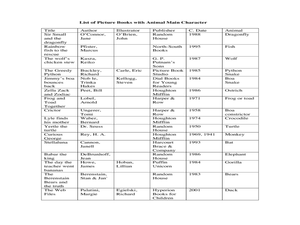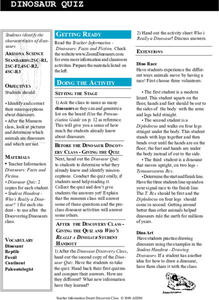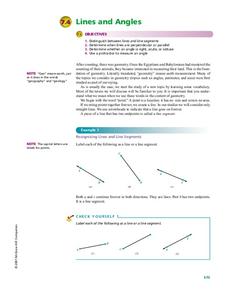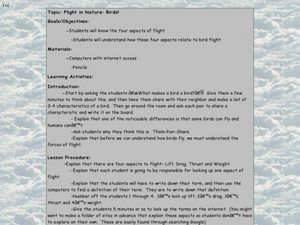Curated OER
Classroom Critters Developing Our Writing Skills
Students investigate animals and how it adapts to its environment. They write notes and gather information on a chosen animal. After research is completed, students create a report about the animal's characteristics, appearance, food,...
Curated OER
The Rainforest
Students learn the characteristics of the rainforest. In this rainforest instructional activity, students read stories about the rainforest and discuss them. Students work in groups to brainstorm all the facts they know about...
Curated OER
Investigation: Reasoning and Proof
Students explore animal characteristics by creating illustrations. In this animal identification instructional activity, students read a list of animal descriptions which they draw using crayons or colored pencils. Students view their...
Curated OER
Animal Characteristics
Students investigate biology by completing a group classification activity. For this animal characteristics, students discuss the different families in the animal kingdom and the small differences that separate the animals. Students...
Curated OER
Strawberry Girl: Outdoors in Florida
Students explore nature by researching the state of Florida. In this animal identification lesson, students read a children' story and research the Internet to discover the difference in animal life between the early 1900's and present...
Curated OER
Old McDonald Dice
Old McDonald had a...die with different barnyard animals on it! This fun template will put a new spin on the classic children's song by letting the roll of a die determine which verse to sing next. Consider printing the dice on card...
Worksheet Web
Burrowing Animals – Ground Squirrels
Why do ground squirrels build their homes in the ground? What's so unique about these burrows? Have individuals read about this burrowing animal, and then respond to five short answer questions that assess their comprehension of the...
Curated OER
Variation
Students recognize similarities and differences in plants. In this plants and animals lesson plan, students begin to classify living things by observable characteristics. Students watch clips from the Internet and play online games....
Curated OER
Find an Animal! Find a Book!
Learners identify the themes of different books by classifying their genre. In this genre lesson, students examine a specific animal by reading both a nonfiction and fiction book about the species. Learners compare the...
Curated OER
Fin, Feathers, or Fur?
Students learn how to classify animals. In this animal characteristics lesson, students read Granddad's Animal Alphabet Book, brainstorm a list of different kinds of animals, and determine their characteristics; fur, feathers or scales....
Curated OER
So You Think You're Tough
Fourth graders learn how to classify animals. In this invertebrates lesson, 4th graders discuss how we classify thinks into groups and move into a discussion about classifying animals. Students learn about the differences between...
Curated OER
Classification of Animals
Students identify observable features of eight dinosaurs and create a sorting chart using SMART Notebook on a SMART Board (or, in case you do not have a SMART Board, a chalk or dry-erase board).
Desert Discoveries
The Sonoran Desert
Elementary schoolers study the geographic location of the Sonoran Desert. They pay close attention to the characteristics of the plants and animals found in this desert environment. The student handouts embedded in this plan are...
Curated OER
Our Zoo Friends
First graders plan and create a model zoo depicting the natural habitats of animals. Their models include animals and a display of written factual information about the animals. Students present their project by conductig a tour of...
Curated OER
Form and Observation
Use a familiar song and adorable baby animal pictures to teach youngsters about genetic variation. Begin by listening to "Twelve Variations on 'Ah vous dirai-je Maman,'" which you will need to find online (there are several versions...
Desert Discoveries
Dinosaur Quiz
Young scientists explore the world of dinosaurs. They engage in a variety of activities designed to help correct misconceptions about dinosaurs, and which help them to determine which animals are dinosaurs and which are not. There is a...
McGraw Hill
Lines and Angles
Why was the obtuse angle upset? Because it was never right! A valuable resource is loaded with background information on types of angles and lines. Learners review the characteristics of parallel, perpendicular, and...
Curated OER
Mammals Have Fur
First graders study animals. In this animal classification lesson, 1st graders explore the characteristics (primarily fur) that distinguish animals as mammals. They work in groups at various stations that practice this classification...
Curated OER
Chips Ahoy: Chip Off the Old Block
First graders compare and contrast adult and baby animals to identify similar characteristics shared by both.
Curated OER
Flight in Nature: Birds!
Students discover how flight works by researching birds. In this animal life lesson plan, students utilize the Internet to find information about the four aspects of flight. Students define the four aspects and label a...
Curated OER
Animal Features
Students identify animals to their correct features. In this animal features lesson, students examine the list of animal features and fill in the blank with the animal that matches the feature.
Curated OER
Bible Lesson on the Christian Walk and Flight
Students explore organized religion by reading excerpts from the Bible. In this Christianity lesson, students listen to their instructors praise Jesus Christ and describe "The Christian Walk." Students view images of flying animals...
Curated OER
Features of Shells
Students create a new shell. In this shell features activity, students different types of shells, discuss their special features and talk about how animals use shells. Students use the Internet to research information on...
Curated OER
Are You One Of Us?
Students discover how to classify things based on their similarities and differences. Students give the characteristics of insects and create a classification list. Given examples of various types of insects, students classify them...























